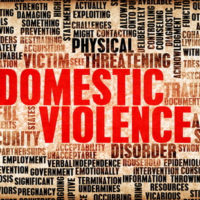
Britny’s Law Enhances Punishment for Domestic Violence in North Carolina
 “Britny’s Law” went into effect on December 1, 2017, enhancing the penalties for domestic violence in North Carolina, according to an article by WRAL.
“Britny’s Law” went into effect on December 1, 2017, enhancing the penalties for domestic violence in North Carolina, according to an article by WRAL.
Three years ago, Britny Puryear was stuck in a vicious relationship. At that time, Britny lived with her boyfriend in Fuqua-Varina, North Carolina. Over the course of four years, their relationship became increasingly abusive. The relationship ended after a violent argument in 2014, when the boyfriend shot and killed Britny in their home.
The boyfriend was arrested and charged with second-degree murder. He pleaded guilty in court and received a 32-year jail term. The boyfriend is currently serving his sentence.
Britny’s parents were not satisfied with this outcome. They felt that first-degree murder should apply, given the abusive history of the relationship. Outside of certain exceptions under the felony murder rule, first-degree murder requires premeditation. Stated otherwise, the killer must plan out the murder ahead of time. Generally speaking, that is a difficult standard to prove in cases of domestic violence like Britny’s, where an argument sparked violence.
To continue the fight, Britny’s parents contacted the North Carolina Coalition Against Domestic Violence (NCCADV). The NCCADV is a nonprofit organization dedicated to ending domestic violence and supporting victims.
Working alongside the NCCADV, Britny’s parents were able to find a Minnesota law that classified domestic violence killings as first-degree murder. So the NCCADV used the Minnesota law as a foundation to create similar legislation in North Carolina.
The initial form of Britny’s law would have made it much easier to apply first-degree murder whenever there was evidence of repeated past abuse. As the bill worked through the North Carolina legislature, however, there were some changes. In its final form, Britny’s law requires a previous conviction for domestic violence in order for first-degree murder to apply.
Overall, Britny’s law clears the path to first-degree murder for future domestic violence killings. If the killer has a previous conviction for domestic violence involving the victim, that qualifies as premeditation. In such circumstances, the resulting charge will likely be first-degree murder, not second-degree murder.
While Britny’s parents are happy to see changes to the domestic violence laws in North Carolina, they plan to continue fighting in their daughter’s honor. They would like to see the initial form of Britny’s law resurrected and signed into law, allowing any past evidence of abuse to escalate a domestic violence killing to first-degree murder.
Do You Need Legal Assistance?
If you are struggling with domestic violence, divorce or related concerns, it can be valuable to seek legal counsel from a trusted family law attorney. Contact Powers Landreth PLLC for dedicated assistance with your case.
Resource:
wral.com/family-still-pushing-for-stricter-domestic-violence-punishments-as-britny-s-law-takes-effect/17152551/
Learn More
Advocates March Against Domestic Violence in Charlotte
 Advocates against domestic violence organized a march in Charlotte on September 28th, according to an article by FOX 46 Charlotte.
Advocates against domestic violence organized a march in Charlotte on September 28th, according to an article by FOX 46 Charlotte.
Featuring domestic violence victims, members of the community and law enforcement officials in their ranks, the advocates marched along North Tryon Street. They displayed a number of signs with messages such as “verbal abuse is domestic abuse” and “men, step up and prevent dv.”
A domestic violence counselor for the Charlotte-Mecklenburg Police Department (CMPD) highlighted the importance of establishing a support network for victims. The counselor also underlined the CMPD dedication to domestic violence issues, with six detectives and four counselors available to victims. The counselor also highlighted the partnership between the CMPD and the Charlotte branch of the Domestic Violence Advocacy Council.
In light of this new development, we will review North Carolina laws concerning domestic violence in the following sections.
How Does North Carolina Define Domestic Violence?
In Section 50B-1 of the North Carolina General Statutes, we can find the state-specific definition of domestic violence.
The first requirement of domestic violence involves a personal relationship. We will discuss the parameters of personal relationships below. But for now, we must note that domestic violence can only apply if the parties have a personal relationship.
The second requirement of domestic violence in North Carolina involves the commission of certain crimes. It is domestic violence if the perpetrator:
- Causes or attempts to cause bodily injury;
- Inflicts substantial emotional distress by placing the aggrieved party in fear of imminent serious bodily injury or continued harassment; or
- Commits rape or other sex offenses.
There is an important exception to Section 50B-1 concerning self-defense. It is not illegal for individuals to defend themselves in a reasonable manner.
How Does North Carolina Define Personal Relationship?
Section 50B-1 also provides us with North Carolina’s definition of personal relationship. As domestic violence only applies in cases where there is a personal relationship, this is an important concept to grasp.
Section 50B-1 outlines a number of categories that qualify as a personal relationship. People who are currently or were previously married spouses. People of the opposite sex who lived together or have previously dated also qualify. People who are engaged in a parent-child relationship – including grandparents and guardians – qualify as well. And another example is current or former household members, even if no dating relationship exists.
Do You Have Questions for an Experienced Family Law Attorney?
Whether you are dealing with domestic violence, divorce or other aspects of family law, it is paramount to take a cautious approach. After all, the legal issues at play concern you and your family, making it difficult to balance personal interests against family needs. Thankfully an experienced family law attorney at the North Carolina office of Powers Landreth PLLC can help you plan the road to recovery with carefully implemented strategy. Don’t hesitate to reach out to us today for help.
Resources:
fox46charlotte.com/news/local-news/dozens-march-against-domestic-violence-in-charlotte
ncleg.net/gascripts/statutes/StatutesTOC.pl?Chapter=0050B
Learn More
Using a Courthouse Dog for Emotional Support
 Appearing before a judge in court, not to mention cases that involve a jury, can be intimidating. For victims who have been sexually assaulted, emotionally tormented, or physically beaten, facing the perpetrator in court can be a truly traumatic event. Luckily, an attorney will help walk you through this process and ensure that you are ready when the time comes to face your violent partner, or will help your child feel secure, brave, and truthful. Additionally, there are new options emerging in North Carolina to help witnesses and victims in court, such as the use of courthouse therapy dogs.
Appearing before a judge in court, not to mention cases that involve a jury, can be intimidating. For victims who have been sexually assaulted, emotionally tormented, or physically beaten, facing the perpetrator in court can be a truly traumatic event. Luckily, an attorney will help walk you through this process and ensure that you are ready when the time comes to face your violent partner, or will help your child feel secure, brave, and truthful. Additionally, there are new options emerging in North Carolina to help witnesses and victims in court, such as the use of courthouse therapy dogs.
Courthouse Dog, Teghan, to be First Therapy Dog Used in North Carolina Court
While the concept is still catching on in North Carolina, many other states have adopted the use of courthouse dogs as sources of therapy during high-stress cases for people exposed to domestic violence, and other victims. Recently, Johnston County became the first to allow the use of a courthouse dog, according to WRAL News. Teghan, a yellow lab, will help ease the pain, fear, and anxiety that many people feel in Johnston County. Local businesses have paid for veterinary costs, the dog’s training, and other expenses all in an effort to level the playing field for victims in court.
How the Defense Uses Your Anxiety, Fear, and Other Emotions to Your Disadvantage
Being confident, articulate, and calm in court is a vital part of your case’s success, whether you are appearing before a judge or a jury. This is always much easier said than done, as even preparation by your attorney can still leave you with high strung nerves. For Charlotte victims of domestic violence, sometimes no amount of practice can prepare them for facing their abuser in court. According to the U.S. Department of Justice, some of the most common mistakes that witnesses or victims make on the stand include:
- Not speaking clearly or loudly;
- Failing to understand the question;
- Appearing disheveled or uneasy;
- Losing their temper;
- Not fully explaining yes or no questions with further detail;
- Failing to appear positive or confident;
- Volunteering information; and
- Not abiding by the courtroom rules.
A courthouse therapy dog may provide the reassurance, comfort, and feeling of security to put many of your anxieties to rest. While a therapy dog may not be available in your case, a compassionate attorney will use other methods and strategies to help you in the courtroom.
Enlist the Help of an Experienced Charlotte, North Carolina Attorney Today
A compassionate domestic violence attorney with experience in such cases will understand the fragile emotional and psychological state that you are coming from. They will provide professional preparation and do everything in their power to put you at ease for your time in court. If you are seeking relief from an abusive relationship, please feel free to contact the Charlotte attorneys of Powers Landreth PLLC today or at your soonest availability.
Resources:
wral.com/johnston-county-hires-dog-to-comfort-courtroom-victims-witnesses/16770705/
justice.gov/usao-mdpa/victim-witness-assistance/tips-testifying-court
Learn More
Trauma Bonding
 If you have been trapped in an abusive relationship and do not know why you have been unable to leave, or family members and friends do not understand why you are still in the relationship, there is a very clear cut answer. It is not just you. There is nothing wrong with you or abnormal with your behavior, because, in fact, there is chemical bond that makes it incredibly difficult to sever even the most abusive, violent relationships. This bond is called trauma bonding, and while we strongly encourage you to call an attorney and law enforcement for help today, it is important that you know why you may have been struggling to break free for so long.
If you have been trapped in an abusive relationship and do not know why you have been unable to leave, or family members and friends do not understand why you are still in the relationship, there is a very clear cut answer. It is not just you. There is nothing wrong with you or abnormal with your behavior, because, in fact, there is chemical bond that makes it incredibly difficult to sever even the most abusive, violent relationships. This bond is called trauma bonding, and while we strongly encourage you to call an attorney and law enforcement for help today, it is important that you know why you may have been struggling to break free for so long.
We all Have Bonds, but Those Who Experience Trauma Have Even More Intense Bonds With Their Partners
Humans are social animals, which means that we form strong bonds with one another. These emotional attachments help us see from another’s point of view, let us forgive one another after an argument or fight, provide high levels of care for others, and, overall, make society as we know it possible. Bonds also make it exceedingly difficult when we lose a loved one, whether it is due to death, divorce, or separation. When trauma is involved, the strength of that bond is drastically increased. A trauma bond is the “misuse of fear, excitement, sexual feelings, and sexual physiology to entangle another person,” according to the Abuse and Relationships Organization. When two people share a traumatic experience together, such as surviving a disastrous mountaineering trip or another type of accident, a special, traumatic, bond is formed. A traumatic bond is also formed when two people engage in extreme sports or activities, or when the relationship is physically, emotionally, or psychologically abusive. Moreover, if a person experienced traumatic incidents earlier in their life, they are even more prone to traumatic bonding with their abusive partner due to cognitive learning.
The Longer the Relationship and More Traumatic the Abuse, the Stronger the Trauma Bond
The longer the abusive relationship lasts, the harder it becomes to leave because the brain has essentially been re-wired to need the abusive person and the trauma that they cause. And, after abuse has occurred, the abused person will tend to seek the comfort or consolation of the person who carried out that very abuse. The abuser controls the abuse–when it stops and starts, therefore they hold not only the power to abuse, but also the power to make the pain end. According to Coping With Trauma: Hope Through Understanding, “the alternation of distress and relief cements the bond.” Additionally, the abused feels entirely dependent upon the abuser. This is why it is so difficult for millions of victims across the country and North Carolina to leave abusive relationships.
Contact an Attorney for Help
Whether you or a family member are trapped in an abusive relationship in which domestic violence occurs frequently or infrequently, it is of the utmost importance that you reach out for help to break the trauma bond. Counselors, safe houses, law enforcement, and attorneys can all offer different and important types of support. Please reach out to the Charlotte, North Carolina domestic violence attorneys at Powers Landreth PLLC today for help with your situation.
Resources:
abuseandrelationships.org/Content/Survivors/trauma_bonding.html
books.google.com/books?id=xHK4vjl-RRAC&pg=PA125#v=onepage&q&f=false
Learn More
Allison’s Law
 North Carolina is currently considering adopting a new law requiring domestic violence offenders to wear ankle GPS bracelets to track their whereabouts. The House Bill, H.B. 46, is also referred to as Allison’s law because it could, if made into a law, save lives such as Allison Holt, who was killed by her estranged husband back in 2009 two days after she filed a restraining order against him. A staggering 60 percent of violence-caused injuries were inflicted on family members, loved ones, or acquaintances, according to the Bureau of Justice Statistics and reported by Mother Jones. And, 60 percent of those injuries happened at home. Additionally, 79 percent of murders, when the victim-murderer relationship was known, were incidents where the victim was a loved one, friend, or acquaintance of the murderer. By keeping tabs on the violent person, lawmakers hope to curb the deaths and injuries of thousands of North Carolina victims each year.
North Carolina is currently considering adopting a new law requiring domestic violence offenders to wear ankle GPS bracelets to track their whereabouts. The House Bill, H.B. 46, is also referred to as Allison’s law because it could, if made into a law, save lives such as Allison Holt, who was killed by her estranged husband back in 2009 two days after she filed a restraining order against him. A staggering 60 percent of violence-caused injuries were inflicted on family members, loved ones, or acquaintances, according to the Bureau of Justice Statistics and reported by Mother Jones. And, 60 percent of those injuries happened at home. Additionally, 79 percent of murders, when the victim-murderer relationship was known, were incidents where the victim was a loved one, friend, or acquaintance of the murderer. By keeping tabs on the violent person, lawmakers hope to curb the deaths and injuries of thousands of North Carolina victims each year.
About the Ankle Bracelet and the Program
The bill calls for the offenders to wear the GPS device at all times (24 hours a day). If they are found outside of their approved zone, they will be arrested immediately. This is all to provide safety for their potential victims. Last year in North Carolina there were 64 domestic violence homicides, according to North Carolina Coalition Against Domestic Violence and reported by WNCN News. The lawmakers of the bill are currently undecided and are seeking feedback from a future Department of Public Safety pilot program on the following:
- Whether GPS units should be worn only by offenders who violate a domestic violence protective order;
- Whether GPS units should also be worn by violent offenders;
- What constitutes a violent offender;
- How the program should be staffed;
- Type of GPS unit to be used;
- Type of GPS monitoring to be used and whether it will provide real time data;
- If the victim’s location will also be monitored for their safety, and what privacy concerns will arise because of that;
- Cost of the program; and
- Comparison of North Carolina’s program to those of other states.
Recent Successful Results in Close-By States
Several other states have had success, including Connecticut, which began their trial program in two high-risk regions back in 2010. The Connecticut Mirror reported that between 2010 and 2013 they had 168 defendants wearing ankle bracelets. As a result, none of the victims were injured or killed in additional assaults.
What is Domestic Violence?
Domestic violence, when the offender is in a relationship with the victim, is causing bodily injury, the attempt to cause bodily injury, or putting the victim or their family members in fear of injury. Placing the victim or their family members in emotional distress over their safety is also considered domestic violence.
Contact a Charlotte, North Carolina Domestic Violence Attorney Today for Help
If you or a family member is the victim of domestic violence of any kind, we strongly encourage you to contact an attorney immediately. Do not hesitate to call the compassionate attorneys of Powers Landreth PLLC Charlotte today.
Resources:
ncleg.net/Applications/BillLookUp/LoadBillDocument.aspx?SessionCode=2017&DocNum=165&SeqNum=0
motherjones.com/politics/2013/04/domestic-violence-murder-stats
ctmirror.org/2013/09/04/gps-ankle-bracelets-reduce-domestic-violence-injuries-connecticut/
wncn.com/2017/02/17/some-seek-solutions-as-domestic-violence-continues-to-plague-nc/
Learn More
Possible Change On the Way for Domestic Violence Law
 Domestic violence is an ongoing problem in North Carolina and throughout the entire country. It is the crime that is least reported to the authorities, and its victims are put in constant fear for their physical and psychological well being. Many fear for their lives, as roughly one quarter of all murders in this country are committed by a family member. A new bill, Senate Bill 600, may raise the punishment for murders committed by spouses when they have a documented history of domestic violence. The bill, if it becomes law, could automatically make a domestic violence murder, a murder in the first degree. While most first degree murders have to have an element of premeditation, some types of murders do not, such as a murder when another violent crime is being committed, such as burglary. Currently, most spousal murders are charged as second degree murders, as they are seen as a crime of passion. However, some lawmakers believe that when a person who has a history of domestic violence, murders their spouse they should automatically be charged with first degree murder. “What we’re finding is that men are using the defense of, it was just done in the heat of passion, when there’s been a history of domestic violence in that relationship,” said Senator Jeff Jackson, D-Mecklenburg, as reported by WRAL.com. While this may increase the penalty for some murders, even if Senate Bill 600 becomes law, tens of thousands of North Carolina victims of domestic violence will continue living in fear and humiliation until they find the courage with the help of friends and family to speak up and take legal action.
Domestic violence is an ongoing problem in North Carolina and throughout the entire country. It is the crime that is least reported to the authorities, and its victims are put in constant fear for their physical and psychological well being. Many fear for their lives, as roughly one quarter of all murders in this country are committed by a family member. A new bill, Senate Bill 600, may raise the punishment for murders committed by spouses when they have a documented history of domestic violence. The bill, if it becomes law, could automatically make a domestic violence murder, a murder in the first degree. While most first degree murders have to have an element of premeditation, some types of murders do not, such as a murder when another violent crime is being committed, such as burglary. Currently, most spousal murders are charged as second degree murders, as they are seen as a crime of passion. However, some lawmakers believe that when a person who has a history of domestic violence, murders their spouse they should automatically be charged with first degree murder. “What we’re finding is that men are using the defense of, it was just done in the heat of passion, when there’s been a history of domestic violence in that relationship,” said Senator Jeff Jackson, D-Mecklenburg, as reported by WRAL.com. While this may increase the penalty for some murders, even if Senate Bill 600 becomes law, tens of thousands of North Carolina victims of domestic violence will continue living in fear and humiliation until they find the courage with the help of friends and family to speak up and take legal action.
Public Humiliation in Place of Time Behind Bars
Some acts of Domestic violence are a felony in North Carolina, though the degree of punishment varies greatly depending on the circumstances, the injuries caused, and other specifics. However, punishment is also heavily weighted based on the court’s choice of sentencing. District Court Judge Mark Cummings, a North Carolina judge, recently gave two men who pleaded guilty to a crime of domestic violence the option of spending time in jail or public humiliation. Both chose public humiliation, and both seemed to agree that they chose the wrong option, according to KTLA 5 News. Both were ordered to carry a sign that said “This is the Face of Domestic Violence” in front of the courthouse for five hours a day, one sentenced to three days and the other to seven. “It’s pure hell, that’s what it’s like. It’s hell, it’s embarrassment,” said one man who also received online threats afterwards. “My friends now think I beat on women. And I don’t,” according to the other man. According to the director of victim services at Family Services of the Piedmont, Shay Harger, “Domestic violence thrives in secrecy and in the dark so this has people talking.”
Call a Domestic Violence Attorney Today
If you are the victim of domestic violence, contact the Charlotte, North Carolina law offices of Powers Landreth PLLC today at 704-342-4357 for immediate assistance. We are prepared to help you today.
Resources:
ncga.state.nc.us/gascripts/BillLookUp/BillLookUp.pl?Session=2017&BillID=s600&submitButton=Go
ktla.com/2017/03/29/pure-hell-judge-orders-public-humiliation-for-domestic-abusers/
wral.com/domestic-violence-homicides-could-be-tried-as-first-degree-murder-cases-under-bill/16628184/
Learn More